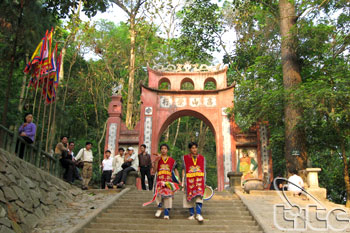The unique practice of worshipping Hung kings in Vietnam will be one of 35 pieces of intangible heritage submitted for recognition at the seventh session of the UNESCO Intergovernmental Committee for the Safeguarding of Intangible Cultural Heritage, which will be held in Paris on December 3-7.
 The information was released by Cecile Duvelle, Chief of the Intangible Cultural Heritage Section of the United Nations Educational, Scientific and Cultural Organisation (UNESCO) at a press conference on Nov. 29 in Paris.
The information was released by Cecile Duvelle, Chief of the Intangible Cultural Heritage Section of the United Nations Educational, Scientific and Cultural Organisation (UNESCO) at a press conference on Nov. 29 in Paris.
She told the Vietnam News Agency that Vietnnam is an active country and has been fully aware of the importance of preserving and promoting its intangible cultural heritage. Vietnam's dossier for protecting heritage this year was detailed and highly appreciated, she added.
Vietnam has delivered many suggestions, including focusing on education to increase awareness for the people - an area that she remarked the country is particularly creative in.
Vietnam provides a model showing that not only rich countries can bring the best solutions, according to Duvelle.
At the press conference, Duvelle revealed that at the upcoming seventh session members will seek ways to better preserve and promote world heritage, establish a committee to assess the heritage nominated this year and consider some countries' request to be supported in heritage preservation.
Vietnam's application, including maps, historical documents and scientific research reports, says that worshipping the Hung kings is a symbol of the culture and beliefs of the people, and that it strengthens the country's solidarity.
Vietnamese legends recount the rule of the 18 Hung King dynasties during the first period of Vietnamese history, between 2879-258 BC.
The Hung kings worshipping rituals are closely related to the worship of ancestors that is a tradition of most Vietnamese families and an important part of the people's spiritual lives.